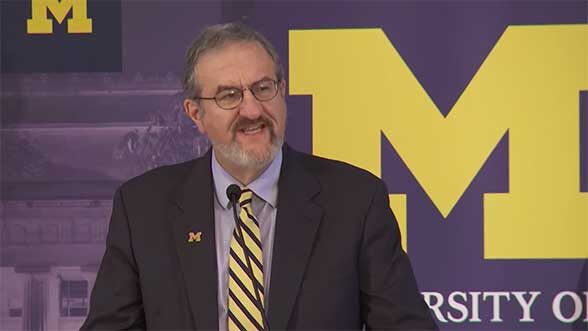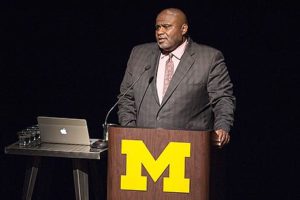“Befitting our legacy and potential”
Declaring the University of Michigan has “the talent to advance excellence and achieve impact at levels befitting both our legacy and our potential,” President Mark Schlissel recently outlined initiatives that target issues ranging from poverty to academic innovation, and from sustainability to diversity.
“These announcements align with my commitment to encourage scholarship that addresses major societal problems, using the full spectrum of our disciplinary breadth,” Schlissel told an invited crowd of nearly 200 faculty, staff, and students gathered at the Michigan Union’s Rogel Ballroom for his annual Leadership Breakfast Oct. 5.
“They also include my pledge to help you provide all of our students with the best education possible, enhanced by high-impact, engaged learning experiences for undergraduates, graduate students, and professional students.”
Schlissel also used the occasion to preview some of next year’s bicentennial celebration, highlighting three Presidential Bicentennial Colloquia, the first of which will feature a conversation with U.S. Supreme Court Justice Sonia Sotomayor, and Justice Susanne Baer of Germany’s Federal Constitutional Court.
“Our full year of bicentennial events and activities gives us a wonderful opportunity to look forward and consider how we should lead in the future — to celebrate and cerebrate, as it were,” he said.
Sotomayor and Baer will be part of a Jan. 30 colloquium, titled “The Future University Community.” The second colloquium on June 26 coincides with a meeting of the Tanner Foundation and will consider “The Evolving Bargain Between Research Universities and Society.” Finally, “The Campus of the Future” on Oct. 26 will explore the future of the residential research University and features a student design competition focusing on how the campus may look in 50 years
Introducing his new initiatives, Schlissel said one of his primary responsibilities is to help everyone at the University achieve the lofty aspirations he has come to recognize in the more than two years that have passed since he became U-M’s 14th president.
“We are ready, as U-M’s first president, Henry Tappan, once said, to ‘carry’ this University ‘forward to perfection,'” Schlissel said. “I am proud to discuss a few of the ways we will do this together.”
Poverty solutions
The University will launch a multidisciplinary initiative to develop new strategies for preventing and alleviating poverty. Poverty Solutions at the University of Michigan will include faculty from many schools and colleges, build on strong community partnerships, and provide new engaged learning opportunities for students.
“As its name implies, our new initiative is focused on action and solutions. We’re going to roll up our sleeves with the goal of having impact directly,” Schlissel said. “The aim here is to translate research into actionable interventions and then to rigorously assess their effectiveness.”
Luke Shaefer, associate professor of social work and public policy, will direct the new initiative.
Academic innovation
The recent launch of an Academic Innovation Initiative, Schlissel said, “represents the next stage in our leadership in higher education.”
“We have assembled large amounts of data that help us scrutinize the effectiveness of our teaching and better understand our students,” he said. “We can now make education for learners at all life stages as dynamic as the global job market they will need to navigate. Our Academic Innovation Initiative will help us apply all of this — the data, the access, and our outstanding faculty talent — in service of higher education and society at large.
Schlissel said he and Provost Martha Pollack have charged the Office of Academic Innovation and the Academic Innovation steering committee with developing recommendations.
http://youtu.be/tgQYQAuI01A
View the full speech by President Mark Schlissel.
Diversity, equity & inclusion
The president also shared news of the campuswide strategic plan to improve diversity, equity, and inclusion.
The plan, titled “Many Voices, Our Michigan,” incorporates individual plans drawn up over the past year by each school, college, and major administrative unit. It will provide overarching strategies in three key areas: creating an inclusive and equitable campus climate; recruiting, retaining and developing a diverse community; and supporting innovative and inclusive scholarship and teaching.“This is both a plan and a pledge,” Schlissel said. “It includes metrics, reporting schedules, and measures of accountability — for me, and for all of us. It includes $85 million in new investments over five years that we consider crucial to our mission.”
Robert M. Sellers, currently vice provost for equity, inclusion, and academic affairs, is now chief diversity officer.
Environment and sustainability
Schlissel discussed an earlier announcement that the University plans to create a new school focusing on sustainability and the environment. It will replace the School of Natural Resources and Environment, build on its predecessor’s strengths, and have a broader mission.
“It will also be a new kind of school,” he said. “It will have new ways of engaging faculty from all across the University, be organized around themes that evolve over time, and have curricula that are intensely engaged.”
The new school will be formally named later this fall, and the search for a dean has begun.
Goal-oriented
Looking back at the goals he laid out during his 2015 Leadership Breakfast, Schlissel recalled one of the efforts that grew out of campuswide sustainability goals — reducing the amount of solid waste generated by the University. Toward that end, he announced that all football games at Michigan Stadium in 2017 would be zero-waste events.
He also reiterated a push for more public engagement by faculty, saying U-M’s future leadership will be evaluated in part by its ability to better focus the University’s work externally, and share scholarship and expertise with a broader public.
“I want to help us disseminate our work in a more conspicuous and public manner, by incentivizing faculty to share their expertise,” Schlissel said. “We should make a particular effort to highlight the work of humanists and social scientists, who contribute greatly to our understanding of and solutions to some of the biggest problems we face as a society.
This fall, he said, U-M will focus on developing faculty engagement in four key areas: better understanding what people are already doing, finding additional ways to celebrate such work, intensifying efforts to reach important constituencies in Washington, D.C., and assisting any faculty members who wish to reach out to a broader public audience.
Schlissel lauded campus collaborations, citing UM-Flint for bringing together faculty from all three campuses to address that city’s water crisis, UM-Dearborn’s new Talent Gateway to help students become “entrepreneurs of themselves,” and Ann Arbor faculty collaborating on faculty search plans as part of a long-term strategy to advance discovery and impact in the biosciences.
And he cheered the Universitywide collaboration that has placed the Victors for Michigan campaign well ahead of schedule toward achieving its $4 billion goal. Donors have made gifts of $3.63 billion, with $839 million designated toward the $1 billion goal for student support, including scholarship, fellowships, internships and global study.
A spirit of community
Finally, the president outlined how the University has confronted challenging issues, both as an academic community and as citizens, and doing so in a “spirit of community.”
He used as examples a recent conversation about campus climate that stemmed from racially charged fliers on campus, a similar conversation in July about racism and violence, faculty and student demonstrations against hate, and student leaders who stepped up as allies against hateful speech and discrimination.
During comments after the speech, Provost Martha Pollack announced the creation of a hotline to help faculty respond and seek advice regarding racially charged events on campus or tense moments in the classroom. The number is staffed at the Center for Research on Learning and Teaching.
“At Michigan, we are strongest when we work to solve problems and promote understanding, together, as one community,” Schlissel said. “As allies. As leaders and best. We are the University of Michigan.”
This story originally appeared in The University Record, U-M’s source of news for and about faculty and staff.





Patrick Cardiff - 1990
There is so much to learn from diversity. It makes me really wish I was back in Ann Arbor being part of it. Heterogeneity is the source of a TRUE “University.” I guess the only thing I can do is accept people for who there are here, where I live, in Washington, DC.
Reply
Gerard Freeman - 1950
I’m not at all reassured that the emphasis on diversity, code for multiculturalism, is a healthy state for our great country was has been renowned for its dedication to the Melting Pot.
IMO opinion I find the diversity mania a product of the elite. What does it mean?
Per Thomas Sowell political diversity is not usually present in the staff of a modern educational institution.See: http://jewishworldreview.com/cols/sowell033115.php3
Does the President of M plan to diversify his staff of profs to include conservatives? Or is just about ethnicity?
Reply
John Cherry - 1974,1984
I hope economic diversity becomes part of the diversity initiative. As I observe publicity surrounding the Victors For Michigan Campaign, a picture emerges of economic elitism. Clearly, you have to raise money from those who have money, but it has the side effect of making wealth the University’s highest priority. I know that is not intended, but there is no counter balance either.
Similarly, there seems to be a reluctance to embrace economic diversity as a specific strategy to circumvent the voters passed prohibition on race based affirmative action.
Reply
Susan Campbell - 1954
It is my hope our university president will return Michigan to its once great status as the Harvard of the West. Is diversity really that big a problem? I feel most students are there to learn and respect their fellow students for their abilities, not race or religion.
Reply
Katherine Cook - Staff
So how do reach out to Trump Voters if Clinton becomes President and the backlash that will happen against immigrants and Muslims? What steps do we take to heal the country of hate and fear?
Also, on the flip side what will the UM do if God forbid Trump is President and thus making racists act out against immigrants and Muslims? How will we stand up to a group having its rights taken away and being branded as ‘other’?
Reply
David S - LSA 1980
We educate students that Trump is not racist, et al. And we don’t lash out against Trump supporters and say we are tolerant when we are not. We recognize diversity is more than skin deep. We don’t coddle students with coloring books and play doh because our candidate did not win. How would that make those in class feel who supported the winning candidate? We seek truth not fake news and stereotypes. Yes, there has been a mindless back lash against truth, law, diversity and our Constitution.
Reply